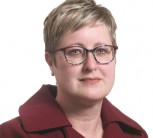Dr Surette van Staden, a lecturer in the Department of Science, Mathematics and Technology Education in the Faculty of Education at the University of Pretoria (UP), is an active researcher in education who, in her most recent research, examined literacy achievement among primary school learners in South Africa. Some of her findings were published in a paper titled ‘Factors that affect South African reading literacy achievement: evidence from prePIRLS 2011’, which she had written in collaboration with Prof Roel Bosker from the Faculty of Behavioural and Social Sciences at the University of Groningen in the Netherlands.
Dr Van Staden set out to identify the factors that predicted reading literacy achievement among Grade 4 learners in South African schools by utilising aspects of Carroll’s model of school learning. The study drew on data contained in the Pre-progress in International Reading Literacy Study (prePIRLS) 2011, which placed South African Grade 4 learners’ results at 461, which is substantially below the international centre point of 500. Selected items from the prePIRLS 2011 questionnaires for learners, parents and teachers were used in a two-level model to determine the effect of learner aptitude, opportunity to learn and quality of instructional events on reading literacy achievement.
The results of the study pointed to the statistical significance of engaged reading and cultivating motivation for reading among learners from an early age, specifically through parental involvement in introducing early literacy activities as the foundation for reading literacy by school-going age. Other results provided evidence that the value of reading is not confined only to reading lessons, but extends across the curriculum. The teaching of reading comprehension skills and strategies, which should form an integral part of reading lessons in the classroom, was identified as a significant predictor of reading literacy achievement.
Unfortunately South African learner performance remains persistently poor and below internationally set standards. Higher reading literacy achievement can, however, be expected where children come from families where reading is valued and children read for their own enjoyment, and where parents regularly read to their children.
Another interesting fact that emerged from Dr Van Staden’s study is that the motivation of learners to read is often the factor that ensures that learning is not superficial and temporary, but rather sustained, permanent and internalised. Evidence suggests that opportunities for reading at classroom level are best utilised when emphasis is placed on reading across the curriculum, and not only during formally scheduled reading time for the duration of language lessons.
The significant finding regarding the effect of teachers’ teaching of reading comprehension skills and strategies provides further evidence that such skills are not mastered through incidental learning, but have to be taught as a very specific learning outcome. There are dramatic reductions in instances of reading failure among primary school children when instruction around issues of word recognition, phonemic awareness, the construction of meaning, vocabulary, spelling and text processing are explicitly taught by classroom teachers.
This means that teachers are ideally situated to create a classroom environment that promotes reading engagement and ultimately produces learners who enjoy reading as modelled by teachers who themselves enjoy reading. Teachers who are enthusiastic readers are more likely to engage their learners in discussion sessions and literature circles, thereby creating stimulating reading engagement opportunities.
In June this year, Dr Van Staden was appointed as one of the inaugural fellows of the Africa Science Leadership Programme (ASLP). The ASLP is an initiative undertaken by UP in collaboration with the Global Young Academy, with the support of the Robert Bosch Foundation. It aims to develop mid-career African academics in the areas of thought leadership, team management and research development, with the intention of enabling them to contribute to the development of a new paradigm for science in Africa, focused on the contribution this can make towards solving the complex issues facing both Africa and the global community.
Twenty of Africa’s brightest minds were chosen from a possible eighty applicants and Dr Van Staden was one of the select few chosen to participate in a week of intense exchanges and discussions to develop game-changing research projects for Africa’s sustainable and equitable development. One of the specific aims of the ASLP is to address some of our country’s problems in the field of education that can be ascribed to a combination of factors, including bad governance, the poor infrastructure of the basic education system and rampant inequality. Public schools are also under-resourced and in short supply, which forces many students to travel long distances just to receive substandard education.
In addition to her appointment as a fellow of the ASLP, Dr Van Staden was also recently appointed as convener of the World Education Research Association (WERA) International Research Network (IRN) on Reading Literacy and Associated Reading Interventions for High-risk Children from Disadvantaged Communities. In this new role she will be responsible for launching, leading and managing the IRN to achieve their outcomes and will be submitting regular progress reports.
See related photo on the right sidebar.
Dr Surrette van Staden
September 16, 2015

Professor Surette van Staden completed her undergraduate studies at the University of Pretoria (UP) and has been doing research at UP since 2002. She says UP has an excellent reputation as a research-intensive university and is a leader in the African higher education landscape.
Prof Van Staden says her research matters because the importance of firm foundations in reading literacy, especially in the early years, is undisputed. About 78% of young children in South Africa cannot read for meaning, and this lack of basic ability is not encouraging for their success in later grades, other subject areas and for their future prospects if they progress to Grade 12.
UP’s Centre for Evaluation and Assessment (CEA) is the national research coordinating centre for the Progress in International Reading Literacy Study (PIRLS) in South Africa. The study assesses reading literacy at Grade 4 and takes place in five-year cycles, with more than 60 countries from geographical areas across the globe participating. South Africa’s participation in PIRLS includes the 2006, 2011 and 2016 cycles of assessment. The latest PIRLS 2021 results will be published at the end of 2022.
Researchers from Stellenbosch University found that the reported trend growth between the PIRLS 2011 and 2016 cycles were underestimated, when in fact, more growth had taken place. While this news was encouraging, the nature of growth still provides evidence that growth occurred only at the lower ends of the reading comprehension skills scales.
Additional analysis of PIRLS 2016 data, as presented in 2021 at the European Conference for Education Research, shows that socioeconomic status is still the overriding factor that impedes growth and development for children who attend schools in poor communities, which have a lack of resources at home and at school. Prof Van Staden says they are eagerly awaiting the results of South Africa’s participation in PIRLS 2021, a study for which data collection was conducted between August and October 2021.
In 2021, the efforts of Prof Nic Spaull and the Human Rights Commission resulted in a Constitutional Court ruling that all children have the right to basic education by age 10. The PIRLS low international benchmark reading skills are used as a guideline for what basic reading constitutes. “Without this data and these benchmarks, rulings like these were likely to remain unattainable with nothing tangible against which to measure progress using international benchmarks.” That is why her research matters, says Prof Van Staden.
She is inspired by her colleagues at the International Association for the Evaluation of Education Achievement, the PIRLS study centre leaders at Boston College and National Research Coordinators from participating PIRLS countries. “They inspire me with their continued effort to effectively monitor their respective education systems to bring about change if and where needed.”
Her role models include, among others, her colleagues at the CEA, Prof Servaas van der Berg, Prof Irma Eloff, Prof Kobus Maree, Prof Lilli Pretorius and Prof Elbie Henning. She will always be indebted to Prof Sarah Howie who gave her an opportunity as a junior researcher at the CEA.
Prof Van Staden adds that when she was working on data analysis for her PhD, Prof Roel Bosker of the Groningen Institute for Education Research at the University of Groningen in the Netherlands was generous in providing assistance and co-authoring subsequent research articles with her. “I also had great admiration for Prof Tim Dunne of the University of Cape Town’s Department of Statistics, whose untimely passing in 2016 is still difficult to fathom.”
Prof Van Staden’s hope for her academic work and research endeavour is to do the best she can for as long as she can with integrity, honesty and humility.
Her advice to school learners and undergraduates who are interested in her field is to work hard and consistently, and encourages them to remember that for every success there are many failed attempts.
In her spare time, Prof Van Staden enjoys reading, singing in a choir and motorbiking with her husband.
 Story
Story
The latest issue of the University of Pretoria’s award-winning RE.SEARCH magazine is available now and reflects a shift towards both a fresher design and outlook. This edition is curated under the theme ‘Digital’, and offers a glimpse into some of the fascinating research we’re doing at UP to drive digital leadership and innovation.
 Story
Story
The articles in this edition showcase work from all nine of our faculties, and underscore our University’s slogan ‘Make today matter’. RE.SEARCH has been named South Africa's top corporate publication as the winner of the 2024 SA Publication's Forum Awards. It is a runner up and finalist in the Excellence category for Communication (runner up), Design and Photography (finalist) and the...
 Story
Story
RE.SEARCH 9 is our most novel edition yet. In it, we have featured research that encourages us to think afresh, and is doing so, we’ve highlighted new ways of looking at research. You can expect to read about research that has potential and promise for the future but which is still nascent or represents an educated guess. This edition also features a range of multimedia that you can immerse...
Copyright © University of Pretoria 2025. All rights reserved.
Get Social With Us
Download the UP Mobile App